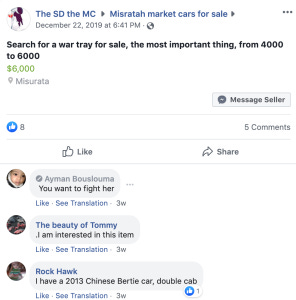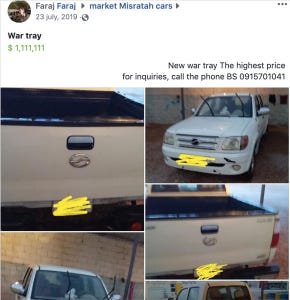Technically Legal – Militias and Libya's Facebook Car Markets
Facebook can be used for many things: to keep in touch with friends, join groups you’re interested in, see what memes your extended family is sharing, and so on. However, in Libya, Facebook often has a very particular use: buying and selling the pickup trucks known as “technicals” that fuel the country’s intractable conflict.
After scanning through numerous Facebook groups and Facebook Marketplace, I found dozens of instances where people were looking to buy or sell “صينية حرب” (in English, “war pickups” or “military pickups”), known as “technicals” to analysts or observers. At their core, technicals are simply pickup trucks of any variety that are mounted with weaponry or used to ferry fighters around the battlefront.
The provenance of many of these vehicles is murky. In the examples I collected, it appeared the pickups were bought and sold after being looted from the battlefront, damaged in clashes, or decommissioned after their owners were killed or left the force that employed them. Most sales of these vehicles are therefore concentrated in large, Libyan port cities with heavy militia presences, such as Benghazi, Misrata, and Tripoli.
However, (and this is where things get even more muddied from the standpoint of Facebook’s legal liability) it appears that, despite these vehicles being advertised in purportedly civilian groups, they are often sold right back to the militias or armed groups that used the technicals in the first place.
For example, this well-used “war pickup” is being sold for $6,500 in a Misrata car market Facebook group.
The seller advertises that the vehicle is fully registered and, to his credit, the number in the booklet matches the truck’s license plate. On the other hand, the logo of the militia group to which it once belonged is visible on the hood. The roll bar used to brace fighters and the vehicle itself against the recoil of a mounted machine gun is also prominently displayed.
Though this truck is being sold in a civilian Facebook group, many of the comments on the post are from militia fighters inquiring about the price, condition, and other aspects of the vehicle. In their public profiles, the weaponry, uniforms, and militia iconography of these units are clearly visible.
Facebook picture of a man tagged in the comments of this post:
Facebook picture of commenter Zakaria Alibey:
Picture of a different militia technical from the Facebook profile of commenter Mohammad Alshatia:
Sellers in these groups can be regular civilians, like the seller in the example above, but can also be militia fighters or people affiliated with armed groups. This fighter, Faraj Faraj, posted to a Facebook group in July about a technical he was trying to sell:
It appears the sale must have gone through because, while there are other photos of him posing with truck-mounted machine guns, the pickup he was trying to sell is nowhere to be found.
People do not only sell on these sites – militia fighters (and others) also say they’re looking to buy technicals and ask people who may have leads on them to get in touch.
For example, this fighter asked members of a Misrata car marketplace group to connect with him if they had a military pickup they were trying to sell. He writes (roughly), “I’m looking for a military pickup, if you have one, post a comment”.

Though his request doesn’t get any public interactions, him and his unit are seen with several pickup trucks in the months after his post. He had not posted pictures of any pickup trucks, let alone armed ones, in the months prior to his May 9th request.
It’s plausible that him and his unit bought these trucks from sellers or leads in the Facebook group. The black pickups in particular are in keeping with the type of technicals sold in these types of groups. Even if he didn’t buy the pickups from the Facebook group, asking if anyone wants to sell him a military vehicle in a purportedly civilian group raises serious moral and legal questions about the intersection between social media and the conflict in Libya.
Perhaps most disturbing feature of these groups are civilians who ask where they can buy technicals. They not only are met with offers of sales or trades but also, in at least one case I reviewed, up-sells on pickups fitted with 23mm machine guns.

The original poster opens the conversation by saying he’s looking for a technical. The first commenter replies with an offer of a technical equipped with a 23mm machine gun, for a good price. The original poster responds, asking if it can be done for 20,000 dinars, to which the commenter says yes, as long as it’s paid by check, not money transfer.
Admittedly, this is an unusually specific case. The majority of civilians looking to buy military vehicles are simply interested in a good deal. For instance, this person says the most important thing for the technical he wants to buy is that it’s between $4,000 and $6,000 (note the first commenter, who asks the poster if he wants to join the fighting with the truck):

Or this person, who just says he wants to buy a technical. He writes, “I want a…military….pickup truck….”

Reporting on the conflict in Libya has focused on the degree to which countries like Turkey, the UAE, and Egypt influence the fighting by providing weapons, intelligence, and military advisors to the various factions. These Facebook sales show that peer-to-peer supply lines and replacements also play an important role in arming and mobilizing opposing factions.
More importantly, whether the trucks are being bought or sold by civilians or armed groups, the ease of purchasing light, mobile artillery platforms on Facebook perpetuates the cycles of violence and access to weaponry that kills and injures so many Libyans.








